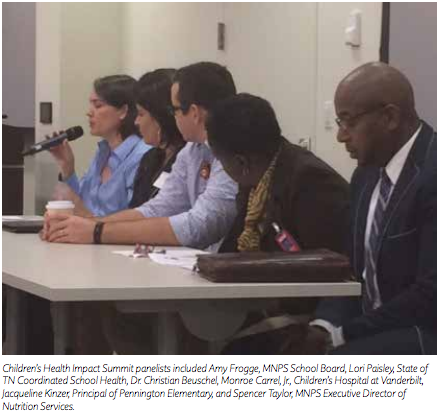Children's Health Executive Oversight Alignment Team

The strong link between education and health is well recognized by leaders in both fields. A healthy student has a much better chance of achieving academic success than a student who is affected by inadequate diet, chronic illness, or an unsafe or unhealthy environment.
The Centers for Disease Control and Prevention states: “Healthy students are better learners. They are better on all levels of academic achievement: academic performance, education behavior and cognitive skills and attitudes.” (CDC "Health and Academic Achievement." CDC - Healthy Youth. CDC, May 2014. Web. 11 Aug. 2014.)

There are six children’s health teams represented in the Alignment Nashville Children’s Health Executive Oversight (CHEO) Team.
- Adolescent Sexual Responsibility
- Healthy Eating and Active Living
- Primary Care
- Healthy Starts
- Behavioral Health/Social and Emotional Living
- School Nutrition
These pillars were formed out of the Children’s Health Summit held in 2007 by Mayor Bill Purcell. There are a number of strategic plans across the city of Nashville and many of them include different aspects of children’s health. CHEO is charged with bringing those strategic plans together and prioritizing the needs out of those plans.
 This team is comprised from the leadership (chair and vice-chair) of each of the five Children’s Health A-Teams. Each month the teams discuss what they are currently focused on and garner feedback from the other teams. This provides a rich forum for what’s happening across the city and in our schools.
This team is comprised from the leadership (chair and vice-chair) of each of the five Children’s Health A-Teams. Each month the teams discuss what they are currently focused on and garner feedback from the other teams. This provides a rich forum for what’s happening across the city and in our schools.
On October 6, 2014, CHEO held a second Children’s Health Summit (with support from the HCA Foundation). The half-day summit was held at the new Lentz Health Department with over 70 key children’s health stakeholders from across the city in attendance. A primary focus of the Summit was a report written by Dr. Charles Basch titled “Healthier Students are Better Learners: A Missing link in School Reforms to Close the Achievement Gap”, he pinpoints seven “educationally relevant health disparities for all children.” These conditions are also recognized within the Coordinated School Health structure through the Tennessee Department of Education and Metro Nashville Public Schools. These conditions are:

During the Summit, attendees created several action items within each condition that were then presented to CHEO for further discussion. Each of the children’s health A-Teams is incorporating these action items into their monthly discussions and tactical planning.
Interview with Marcy Melvin
Centerstone
Which focus area were you matched with at the Children's Health Impact Summit?
I was matched with aggression and violence
What did you hear about educationally-relevant health inequities that surprised you?
What have you seen in your work that is reflective of the importance of these issues?
I did not hear anything that surprised me, I was excited to hear that there is conversation
surrounding school start times for middle and high school students. While I am very excited
about the district wide breakfast and lunch provided to all students, I would like there to be more conversation or greater attention/ accountability to the actual nutritional value of the food that is being served. Providing breakfast (lunch) vs. providing a healthy breakfast (lunch) are two very different statements.
Based on the discussion at your table, what are some steps we can take as a community to improve our children's health and ability to succeed? Greater education and communication at multiple levels related to understanding violence and aggression. At the student level, school staff level, administration level, community level as well as family level.
How will you contribute to this effort going forward? Engage in further conversations with MNPS related to training and supports being offered to school staff and administrators related to understanding as well as managing aggression and violence.
CHEO A-TEAM MEMBERS
Bill Paul, MD, Chair, Metro Public Health Department
Alison McArthur, Metro Nashville Public Schools
Cel Franklin, Metro Nashville Public Schools
DYuanna Allen, Metro Public Health Department
Glen Biggs, Alignment Nashville
Heather Chalos, Alignment Nashville
Jackie Contreras, Nashville Farmers' Market
Jaleesa Johnson, Alignment Nashville
Jo Ann Scalf, Nashville Public Television
Johnsie Holt, Metro Nashville Public Schools
Kathy Gracey, Vanderbilt University
Kimberlee Wyche-Etheridge, MD, Tennessee State University
Kyla Krengel, Metro Nashville Public Schools
Latissa Hall, Metro Public Health Department
Lexi Morritt, Alignment Nashville
Lyndsey Godwin, Vanderbilt Carpenter Program
Marcy Melvin, Centerstone
Nicole Proffitt, Metro Nashville Public Schools
Spencer Taylor, Metro Nashville Public Schools
Susan Evans, Metro Nashville Public Schools
Summit Partners
Belmont University
Centerstone
Community Food Advocates
Coordinated School Health, Sate of Tennessee
Cumberland Pediatric Foundation
Family Center of Tennessee
Meharry Medical College
Meharry-Vanderbilt Universities
Mental Health Association Middle Tennessee
Metro Nashville Government
Metro Nashville Public Schools
Metro Nashville Public Schools Board of Education
Metro Public Health Nashville
Monroe Carrell, Jr. Children's Hospital at Vanderbilt
Nashville Public Television
TENNderCare
Tennessee Department of Education
Tennessee State University
TN Child Care Resource & Referral Network
United Neighborhood Health Systems
University of Tennessee Extension
Vanderbilt Institute for Global Health
Vanderbilt University Behavioral Health
Vanderbilt University
Walk Bike Nashville
For more information, contact Glen Biggs, Senior Associate Director.


